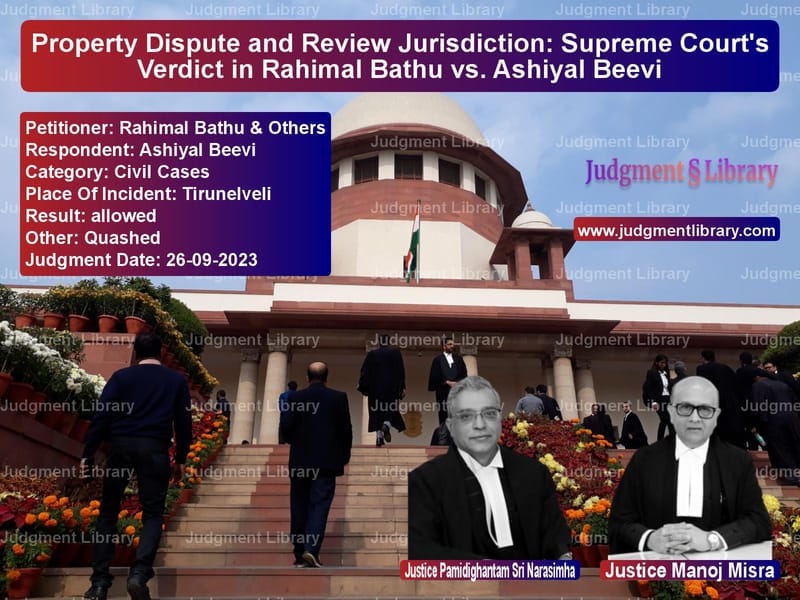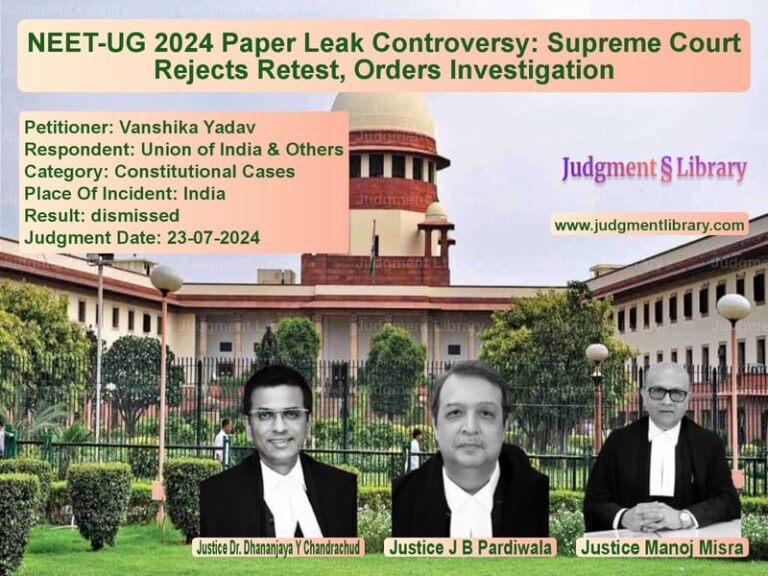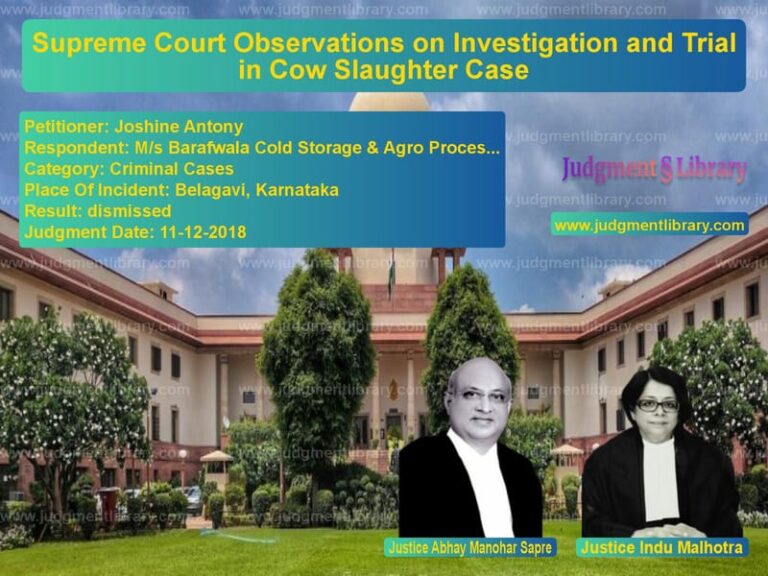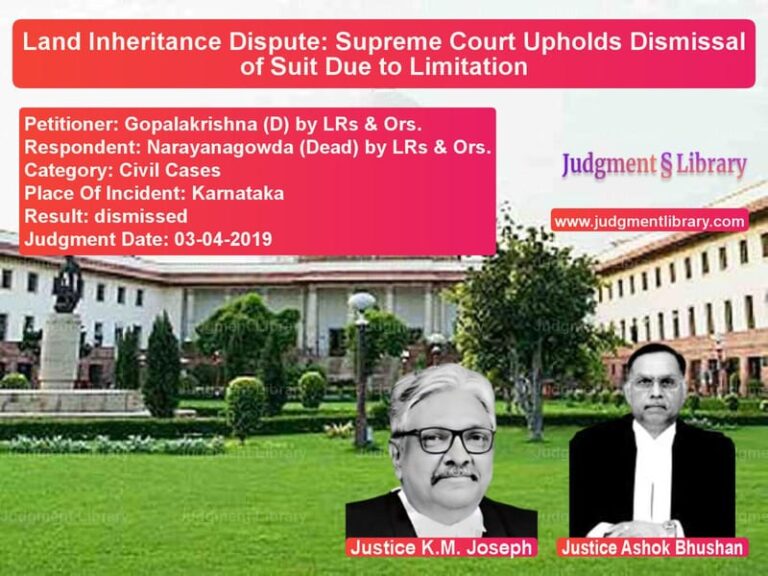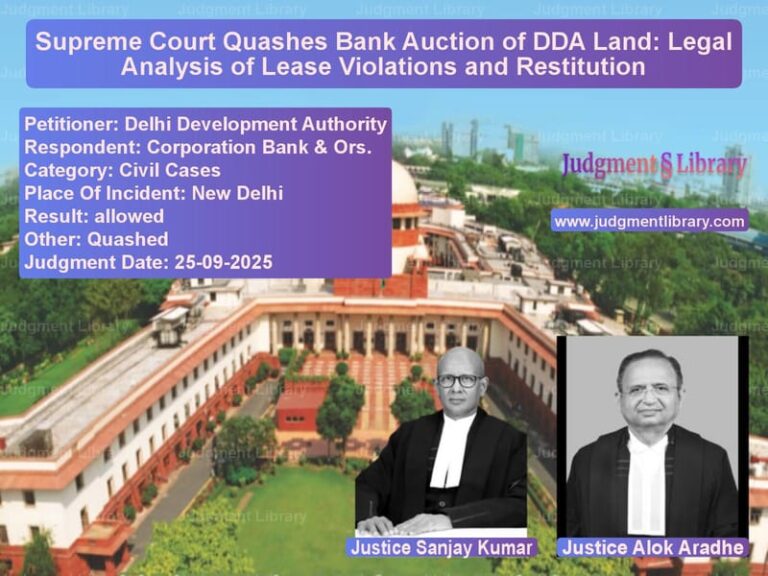Property Dispute and Review Jurisdiction: Supreme Court’s Verdict in Rahimal Bathu vs. Ashiyal Beevi
The case of Rahimal Bathu & Others vs. Ashiyal Beevi revolved around a property dispute and the legal question of whether a revision under Section 115 of the Code of Civil Procedure (CPC) was maintainable against an order rejecting a review application for an appealable decree. The Supreme Court was called upon to decide if the Madras High Court exceeded its jurisdiction by modifying a trial court’s decree while entertaining a revision petition.
Background of the Case
The dispute originated in 1992 when Ashiyal Beevi (the respondent) filed a suit for ownership and possession of a property or, in the alternative, sought partition declaring her one-sixth share. The property initially belonged to Fathima Beevi, the plaintiff’s grandmother. The key contention was a gift-deed executed in 1982 by Fathima Beevi in favor of her son-in-law, Khaja Mohideen, which the plaintiff alleged was obtained through undue influence.
The trial court ruled that:
- The property originally belonged to Fathima Beevi.
- The 1982 gift deed was invalid.
- The 1990 sale deed executed in favor of the plaintiff was valid.
- The plaintiff was entitled to only a one-sixth share, not full ownership.
Dissatisfied with the partial relief, the plaintiff filed a review application, which was rejected by the trial court in 2006. She then moved the Madras High Court under Section 115 of CPC. The High Court not only set aside the trial court’s order but also modified the decree, granting her absolute ownership of the property.
Petitioner’s Arguments (Rahimal Bathu & Others)
The defendants, represented by Senior Counsel A. Sirajudeen, contended that:
- The High Court exceeded its revisional jurisdiction by modifying the decree instead of remitting it back to the trial court.
- A revision petition against a review rejection was not maintainable since an appeal against the decree was the correct remedy.
- The modification of the decree by the High Court prejudiced the defendants’ right to appeal under Section 96 of CPC.
- The High Court merged the trial court’s decree into its revised order, affecting the defendant’s ability to challenge the original judgment.
Respondent’s Arguments (Ashiyal Beevi)
The respondent’s counsel, V. Prabhakar, countered with the following arguments:
- Under Section 115 CPC, a High Court has the power to correct jurisdictional errors and ensure justice.
- The trial court’s decision contained a contradiction—it invalidated the 1982 gift-deed but still did not award full ownership to the plaintiff.
- The rejection of the review application created an injustice, which the High Court rightly corrected.
- The revision was valid as the review rejection order was not appealable under Order XLVII, Rule 7 of CPC.
Supreme Court’s Ruling
The Supreme Court ruled on two major issues:
1. Whether a Revision Petition Under Section 115 CPC Was Maintainable
- The court acknowledged that an order rejecting a review application is not appealable under Order XLVII, Rule 7.
- However, it emphasized that revisionary jurisdiction is discretionary and should not be exercised if another remedy, such as an appeal against the decree, is available.
- The court held that since an appeal against the trial court’s decree was available, the High Court should not have entertained the revision.
2. Whether the High Court Exceeded Its Jurisdiction
- The Supreme Court found that the High Court wrongly modified the trial court’s decree instead of remitting the matter for review.
- By altering the decree, the High Court deprived the defendants of their statutory right to appeal.
- The modification of the decree by the High Court created a merger effect, preventing the defendants from appealing the original decree.
Final Judgment
The Supreme Court held that:
- The High Court’s judgment was erroneous and beyond its revisional jurisdiction.
- The proper remedy for the respondent was to file an appeal against the decree rather than a review application.
- The High Court’s order was set aside, and the original decree of the trial court was restored.
- The plaintiff (respondent) was given the liberty to file an appeal against the trial court’s decree, along with an application to condone the delay.
Impact of the Judgment
The ruling sets significant precedents:
- High Courts must exercise caution while exercising revisional jurisdiction.
- A review application cannot be used as a substitute for an appeal.
- Defendants’ right to appeal a decree should not be compromised due to High Court intervention.
- Trial court decrees must be appealed, not revised, unless there is a clear jurisdictional error.
Conclusion
The Supreme Court’s ruling in Rahimal Bathu & Others vs. Ashiyal Beevi reaffirms the principle that revision petitions should not be entertained where an appealable decree exists. The judgment emphasizes the importance of procedural discipline and protects the rights of defendants from being unfairly deprived of their appellate remedies. By setting aside the High Court’s order, the Supreme Court upheld judicial propriety and reinforced the limits of revisional jurisdiction.
Petitioner Name: Rahimal Bathu & Others.Respondent Name: Ashiyal Beevi.Judgment By: Justice Pamidighantam Sri Narasimha, Justice Manoj Misra.Place Of Incident: Tirunelveli.Judgment Date: 26-09-2023.
Don’t miss out on the full details! Download the complete judgment in PDF format below and gain valuable insights instantly!
Download Judgment: rahimal-bathu-&-othe-vs-ashiyal-beevi-supreme-court-of-india-judgment-dated-26-09-2023.pdf
Directly Download Judgment: Directly download this Judgment
See all petitions in Property Disputes
See all petitions in Contract Disputes
See all petitions in Succession and Wills
See all petitions in Specific Performance
See all petitions in Judgment by P.S. Narasimha
See all petitions in Judgment by Manoj Misra
See all petitions in allowed
See all petitions in Quashed
See all petitions in supreme court of India judgments September 2023
See all petitions in 2023 judgments
See all posts in Civil Cases Category
See all allowed petitions in Civil Cases Category
See all Dismissed petitions in Civil Cases Category
See all partially allowed petitions in Civil Cases Category

